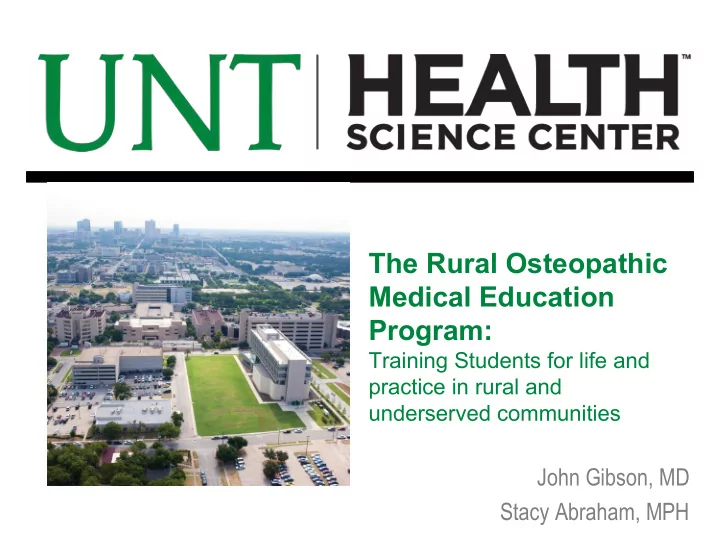

The Rural Osteopathic Medical Education Program: Training Students for life and practice in rural and underserved communities John Gibson, MD Stacy Abraham, MPH
Rural Osteopathic Medical Education (ROME) Program • Mission: To create solutions for healthier rural communities • Our Goals • To provide a foundation for life and practice in a rural community • To prepare the graduate for acceptance into premier medical education programs • To prepare osteopathic graduate for practice in a changing rural environment in the 21 st century • Additional curriculum given to prepare students in rural locations with a preceptor based model • Recent changes in Admission Process- Class of 2021
ROME Rural Scholars Program: Curriculum Overview
Year 1 & 2 • Skills development • patient communication • physical exam • procedural skills • well woman exam • Trained patients for reinforcement of communication and exam skills
Ultrasound training • SONOSIM: required web-based US training • utilizes probe that simulates hands on US • Students required to do 4 to 5 modules per semester with testing and Mastery quiz • Ultrasound workshops: done in SIM lab 3 to 4 times per semester
MERCY CLINIC: Early Clinical Experiences Faith-based free clinic Located about 5 miles from UNTHSC. Open Tues/Thurs Evenings 5 to 8pm Rome students spend 3 to 4 evenings per semester seeing patients with ROME faculty (Dr Gibson, Dr Hadley)
ROME Rural Scholars Program: Curriculum Overview
Preceptor vs HUB Model Wichita Falls Bells Olney Sherman Decatur Longview Athens Ft. Worth Abilene Midland San Angelo Halletsville Cuero Victoria Port Lavaca
ROME Rural Scholars Program: Curriculum Overview
Research Opportunities • Community Health Research Projects • Nutritional Literacy and Habits Among Rural Texans • An Evaluation of Pre-Natal Behaviors in a Rural Texas Community • Identifying Barriers to Breast Cancer Screening/Mammography in Fredericksburg, Texas • HRSA Grant- Dual Degree DO-MPH program • Future Research Opportunities • Women’s healthcare in rural Texas; reducing women & child mortality • Telehealth • Butterfly IQ
International Rotations • Rural vs International • Student interest driven • 3 rd and 4 th year possibilities • Opportunity for advanced procedural skills • Graduate certificate of global health
Students at Mae Fah Luang January 2017 Department Global Health UNT HSC
Malawi Global Medicine Program
Rural Scholars 2010-2017 Gender Ethnicity Female Male White Asian Hispanic Black
Rural Scholars 2010-2017 • In Practice 39% • In Residency 54% • In Fellowship 2% • Cannot Reach 5%
Rural Scholars 2010-2015 Types of Speciality Primary Care Specialty 78% Family Medicine 63% Internal Medicine 6% Pediatrics 9% Other Specialties 22%
Rural Scholars 2010-2015 33% Practicing in area of less than 50,000
Rural Scholars 2010-2015 59% Serving in Medically Underserved Areas 17% Serving in Health Professional Shortage Area
Future Directions • What can we do to give back to Rural Communities? • Research initiatives • Faculty development- access to library and medical education resources, CME, on-site short courses (e.g. ALSO, ACLS)
Questions? Office of Rural Medical Education rome@unthsc.edu 817-735-2354
Recommend
More recommend